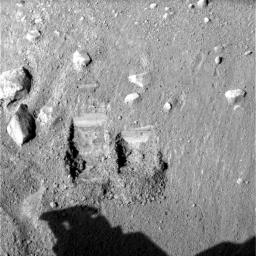
|
“Dodo” and “Baby Bear” Trenches
- Click the image above for a larger view
- Full-Res JPEG (1024 x 1024) (271.8 kB)
- Full-Res TIFF (1024 x 1024) (1.1 MB)
Caption:
NASA's Phoenix Mars Lander's Surface Stereo Imager took this image on Sol 11 (June 5, 2008), the eleventh day after landing. It shows the trenches dug by Phoenix's Robotic Arm. The trench on the left is informally called "Dodo" and was dug as a test. The trench on the right is informally called "Baby Bear." The sample dug from Baby Bear will be delivered to the Phoenix's Thermal and Evolved-Gas Analyzer, or TEGA. The Baby Bear trench is 9 centimeters (3.1 inches) wide and 4 centimeters (1.6 inches) deep.
Background Info:
The Phoenix Mission is led by the University of Arizona, Tucson, on behalf of NASA. Project management of the mission is by NASA's Jet Propulsion Laboratory, Pasadena, Calif. Spacecraft development is by Lockheed Martin Space Systems, Denver.
Photojournal Note: As planned, the Phoenix lander, which landed May 25, 2008 23:53 UTC, ended communications in November 2008, about six months after landing, when its solar panels ceased operating in the dark Martian winter.
Cataloging Keywords:
| Name | Value | Additional Values |
|---|---|---|
| Target | Mars | |
| System | ||
| Target Type | Planet | |
| Mission | Phoenix | |
| Instrument Host | Phoenix Lander | Phoenix Mars Lander |
| Host Type | Lander | |
| Instrument | Robotic Arm | Solid-State Imaging (SSI), Thermal and Evolved Gas Analyzer (TEGA) |
| Detector | ||
| Extra Keywords | Grayscale, Thermal | |
| Acquisition Date | ||
| Release Date | 2008-06-06 | |
| Date in Caption | 2008-06-05 | |
| Image Credit | NASA/JPL-Caltech/University of Arizona/Texas A&M University | |
| Source | photojournal.jpl.nasa.gov/catalog/PIA10775 | |
| Identifier | PIA10775 | |
